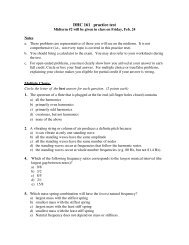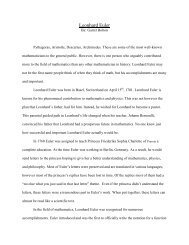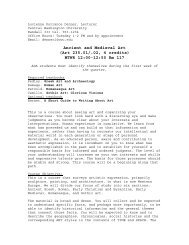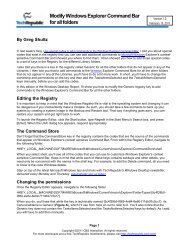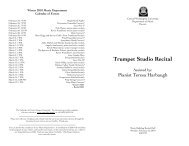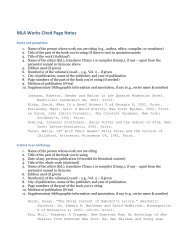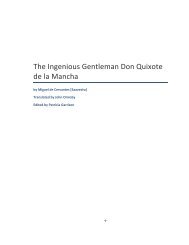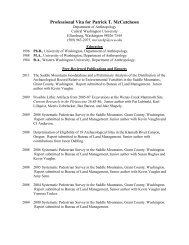THE COURAGE OF TURTLES - Central Washington University
THE COURAGE OF TURTLES - Central Washington University
THE COURAGE OF TURTLES - Central Washington University
Create successful ePaper yourself
Turn your PDF publications into a flip-book with our unique Google optimized e-Paper software.
Orwell 11<br />
brought to a satisfactory conclusion, and so on and so forth.<br />
Pretentious diction. Words like phenomenon, element, individual (as noun),<br />
objective, categorical, effective, virtual, basic, primary, promote, constitute, exhibit,<br />
exploit, utilize, eliminate, liquidate, are used to dress up simple statements and give an<br />
air of scientific impartiality to biased judgments. Adjectives like epoch-making, epic,<br />
historic, unforgettable, triumphant, age-old, inevitable, inexorable, veritable, are used<br />
to dignify the sordid processes of international politics, while writing that aims at<br />
glorifying war usually takes on an archaic colour, its characteristic words being: realm,<br />
throne, chariot, mailed fist, trident, sword, shield, buckler, banner, jackboot, clarion.<br />
Foreign words and expressions such as cul de sac, ancien regime, deus ex machina,<br />
mutatis mutandis, status quo, gleichschaltung, weltanschauung, are used to give an air<br />
of culture and elegance. Except for the useful abbreviations i.e., e.g, and etc., there is no<br />
real need for any of the hundreds of foreign phrases now current in English. Bad writers,<br />
and especially scientific, political and sociological writers, are nearly always haunted by<br />
the notion that Latin or Greek words are grander than Saxon ones, and unnecessary<br />
words like expedite, ameliorate, predict, extraneous, deracinated, clandestine,<br />
subaqueous and hundreds of others constantly gain ground from their Anglo-Saxon<br />
opposite numbers.' The jargon peculiar to Marxist writing (hyena, hangman, cannibal,<br />
petty bourgeois, these gentry, lacquey, flunkey, mad dog, White Guard, etc.) consists<br />
largely of words and phrases translated from Russian, German or French; but the<br />
normal way of coining a new word is to use a Latin or Greek root with the appropriate<br />
affix and, where necessary, the -ize formation. It is often easier to make up words of this<br />
kind (deregionalize, impermissible, extramarital, non-fragmentary, and so forth) than<br />
to think up the English words<br />
'An interesting illustration of this is the way in which the English flower names which<br />
were in use till very recently are being ousted by Greek ones, snapdragon becoming<br />
antirrhinum, forget-me-not becoming myosotis, etc. It is hard to see any practical<br />
reason for this change of fashion: it is probably due to an instinctive turning-away from<br />
the more homely word and a vague feeling that the Greek word is scientific.<br />
that will cover one's meaning. The result, in general, is an increase in slovenliness and<br />
vagueness.<br />
Meaningless words. In certain kinds of writing, particularly in art criticism and<br />
literary criticism, it is normal to come across long passages which are almost completely<br />
lacking in meaning? Words like romantic, plastic, values, human, dead, sentimental,<br />
natural, vitality, as used in art criticism, are strictly meaningless, in the sense that they<br />
not only do not point to any discoverable object, but are hardly ever expected to do so by<br />
the reader. When one critic writes, "The outstanding feature of Mr. X's work is its living<br />
quality," while another writes, "The immediately striking thing about Mr. X's work is its<br />
peculiar deadness," the reader accepts this as a simple difference of opinion. If words






